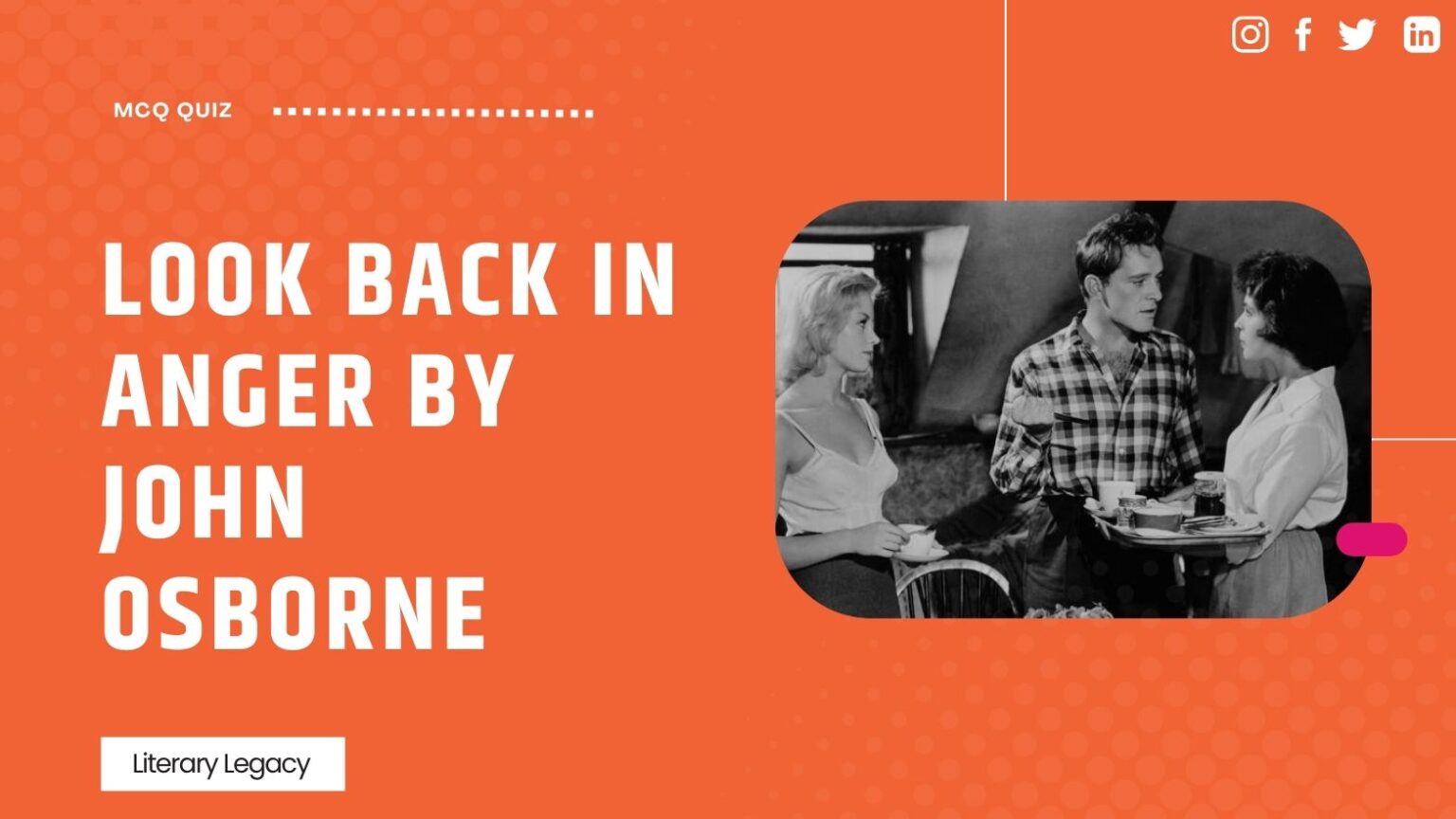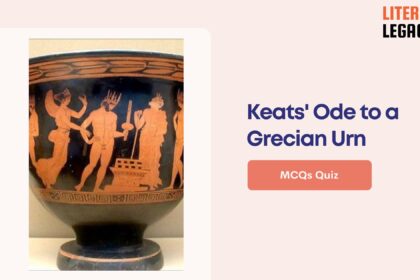1. What motivates Jimmy to want to marry Alison?
A) Their time spent on upper class raids
B) A desire to defy her parents’ disapproval
C) Financial stability
D) His love for her
Answer: (B)
A desire to defy her parents’ disapproval
Alison mentions that her parents’ disapproval of her marriage led Jimmy to want to marry her.
2. How does Jimmy react to Helena’s attempts to reason with him?
A) He agrees with her completely
B) He responds with insults
C) He becomes calm and understanding
D) He listens attentively to her
Answer: (B)
He responds with insults
Jimmy unleashes a series of outrageous insults against Alison’s mother when Helena tries to reason with him.
3. What does Colonel Redfern imply about his previous stance toward Jimmy?
A) He still disapproves of their marriage
B) He thinks he might have overreacted initially
C) He is convinced that old England is better
D) He believes he is more progressive than before
Answer: (B)
He thinks he might have overreacted initially
Colonel Redfern expresses that he feels he and Alison’s mother were too strong in their reactions to Alison’s marriage with Jimmy.
4. What does Helena believe about her relationship with Jimmy after Alison’s return?
A) It is stronger than ever
B) It lacks depth and strength
C) They have a perfect understanding
D) She should fight for it at all costs
Answer: (B)
It lacks depth and strength
Helena considers that presence of Alison has reminded her that her relationship with Jimmy is wrong.
5. How does Jimmy describe true love to Helena?
A) It requires unconditional support
B) It requires emotional strength and fragility
C) It requires muscle and guts
D) It requires constant communication
Answer: (C)
It requires muscle and guts
Jimmy tells Helena that true love requires ‘muscle and guts.’
6. What does Alison confess to Jimmy about her feelings after a significant event?
A) She understands the depth of emotion he wanted her to have
B) She feels anger towards Helena
C) She regrets not leaving with her father
D) She desires to be a more powerful woman
Answer: (A)
She understands the depth of emotion he wanted her to have
Following her miscarriage, Alison tells Jimmy that it has made her grasp the depth of emotion he had sought from her.
7. How does Jimmy react upon learning that Alison is leaving?
A) He remains indifferent
B) He pleads for her to stay
C) He breaks down in tears
D) He insults her and Helena
Answer: (D)
He insults her and Helena
Jimmy insults Helena and expresses disdain at Alison’s decision to leave.
8. What is the significance of Alison’s miscarriage in the narrative?
A) It leads to her reconciling with her parents
B) It acts as a turning point for her emotional understanding
C) It reinforces Jimmy’s perception of her strength
D) It signifies the end of her relationship with Jimmy
Answer: (B)
It acts as a turning point for her emotional understanding
Alison’s miscarriage serves as a pivotal moment for her emotional growth and understanding.
9. Which character expresses disappointment in the romantic relationship between Jimmy and Helena?
A) Hugh
B) Colonel Redfern
C) Cliff
D) Alison
Answer: (C)
Cliff
Cliff expresses frustration and disappointment over Helena’s disruption of their lives.
10. What is Jimmy’s emotional state at the end of the act?
A) Indifferent and detached
B) Eager and hopeful
C) Furious and despondent
D) Content and happy
Answer: (C)
Furious and despondent
At the end of the act, Jimmy is left feeling furious and despondent after witnessing Alison’s departure.
11. What is the primary conflict between Jimmy and Alison in the play?
A) Alison’s disinterest in Jimmy’s career
B) Alison’s ambition to be a writer
C) Their differing socio-economic backgrounds
D) Jimmy’s desire to move away from England
Answer: (C)
Their differing socio-economic backgrounds
The central conflict arises from their different class backgrounds, which affects their relationship.
12. What does Jimmy believe is necessary for experiencing true human emotion?
A) Financial success
B) Love and happiness
C) Suffering
D) Social acceptance
Answer: (C)
Suffering
Jimmy thinks that suffering is the only way to truly connect with human emotion.
13. Who is Cliff Lewis in relation to Jimmy and Alison?
A) Their financial advisor
B) Alison’s brother
C) An upper class acquaintance
D) Jimmy’s childhood friend and roommate
Answer: (D)
Jimmy’s childhood friend and roommate
Cliff is an affable working class man and Jimmy’s longtime friend, living with them.
14. What significant information does Alison reveal to Cliff?
A) She has a job offer in London
B) She wants to move to another country
C) She plans to leave Jimmy
D) She is pregnant with Jimmy’s child
Answer: (D)
She is pregnant with Jimmy’s child
Alison confides in Cliff that she is pregnant but hasn’t yet told Jimmy.
15. What is the nature of the relationship between Alison and Cliff in Act 1?
A) They are siblings
B) They are secretly in love
C) They are rivals for Jimmy’s affection
D) They share a platonic friendship
Answer: (D)
They share a platonic friendship
Cliff and Alison have a supportive and platonic relationship, providing comfort to one another.
16. How does Jimmy respond when he finds Alison and Cliff kissing?
A) He confronts them directly
B) He reacts with anger and leaves immediately
C) He ignores the situation completely
D) He laughs and joins them
Answer: (C)
He ignores the situation completely
Jimmy does not acknowledge or object to the moment when he sees Alison and Cliff kissing.
17. What triggers Jimmy’s explosive reaction when Helena Charles is mentioned?
A) His dislike for upper class people
B) His fear of fatherhood
C) His desire for personal freedom
D) His jealousy of Cliff
Answer: (A)
His dislike for upper class people
Jimmy’s anger is rooted in his disdain for upper class complacency, which Helena represents.
18. Which game do Alison and Jimmy play to escape into affection?
A) Cat and Mouse
B) Hide and Seek
C) Bear and Squirrel
D) Duck and Goose
Answer: (C)
Bear and Squirrel
Alison and Jimmy’s playful ‘bear and squirrel’ game allows them to express affection amidst tension.
19. What event complicates the dynamics in Alison and Jimmy’s relationship in Act 1?
A) Jimmy losing his job
B) Alison’s pregnancy announcement
C) Alison receiving a call from Helena
D) Cliff moving out
Answer: (C)
Alison receiving a call from Helena
The mention of Helena wanting to stay with them escalates the tension and complicates their relationship.
20. How does Jimmy perceive the emotional state of upper class individuals like Alison?
A) They are dull and less alive
B) They have better relationships
C) They are more intellectual
D) They are more secure and happy
Answer: (A)
They are dull and less alive
Jimmy believes that because upper class individuals do not suffer, they are less capable of real emotions.
21. What significant change did the British Mass Education Act of 1944 bring to secondary education?
A) It restricted education to primary levels only.
B) It made secondary education free for everyone.
C) It eliminated public funding for education.
D) It made secondary education available only to the wealthy.
Answer: (B)
It made secondary education free for everyone.
The Act made secondary education free for all, leading to broader access.
22. How does Jimmy view the difference between lower class and upper class individuals?
A) Upper class individuals are more connected to society.
B) Upper class individuals are more active in societal change.
C) Lower class individuals possess deeper insights due to their suffering.
D) Lower class individuals are inherently less intelligent.
Answer: (C)
Lower class individuals possess deeper insights due to their suffering.
Jimmy believes suffering gives lower class individuals a better understanding of the world.
23. What does Jimmy complain about in the context of 1950s Britain?
A) The lack of good, brave causes to fight for.
B) The abundance of noble causes to support.
C) The rise of traditional gender roles in society.
D) The overwhelming support for working-class plays.
Answer: (A)
The lack of good, brave causes to fight for.
He feels disillusioned due to the absence of meaningful causes in society.
24. In what way does the play ‘Look Back in Anger’ depict gender dynamics?
A) It advocates for extreme feminist ideals.
B) It solely promotes traditional roles for women.
C) It illustrates the transition from wartime roles to domestic expectations.
D) It ignores the role of gender entirely.
Answer: (C)
It illustrates the transition from wartime roles to domestic expectations.
The play addresses the conflict between new and traditional gender roles post-war.
25. How does the theme of love manifest in Jimmy’s perspective?
A) Love is strictly a contract without emotional ties.
B) Love is superficial and easily discarded.
C) Love brings only pain and suffering.
D) Love is always fulfilling and joyful.
Answer: (C)
Love brings only pain and suffering.
Jimmy equates love with pain, reflecting his troubled emotional state.
26. What does Helena imply about Jimmy’s character and his beliefs?
A) He embraces modern British values completely.
B) He is fully content with his role in society.
C) He is out of place in his current time period.
D) He is blind to the struggles of upper class individuals.
Answer: (C)
He is out of place in his current time period.
Helena suggests that Jimmy’s mindset does not fit with the realities of the 1950s.
27. Which of the following best identifies the ‘angry young men’ movement?
A) A theater movement showcasing working-class disillusionment.
B) A social reform movement focused on education.
C) A literary movement promoting upper class values.
D) A feminist movement advocating for women’s rights.
Answer: (A)
A theater movement showcasing working-class disillusionment.
The movement highlighted the disillusionment of working-class authors in British theater.
28. What is a central conflict demonstrated through the character of Jimmy in ‘Look Back in Anger’?
A) His relationships are founded on overwhelming joy.
B) His anger is directed solely at himself.
C) His struggles are against traditional family values.
D) His disillusionment with societal norms and political emptiness.
Answer: (D)
His disillusionment with societal norms and political emptiness.
Jimmy’s character embodies the conflicts related to disillusionment and societal expectations.
29. Which statement reflects a misconception about the relationship between suffering and class in the play?
A) Suffering is irrelevant to personal identity.
B) All lower class people suffer more than upper class individuals.
C) Upper class individuals do not experience suffering.
D) Suffering grants lower class individuals deeper life insights.
Answer: (C)
Upper class individuals do not experience suffering.
The play suggests that upper class individuals can also experience suffering but differ in their perspectives.
30. What role did women adopt during World War II, as depicted in the play?
A) They solely worked in the healthcare sector.
B) They reverted entirely back to household roles after the war.
C) Many women maintained jobs outside their traditional roles.
D) Women were not involved in the labor force during the war.
Answer: (C)
Many women maintained jobs outside their traditional roles.
The play reflects the conflict women faced as they balanced wartime roles with post-war expectations.
31. What do the newspapers symbolize for Jimmy?
A) His relationship with Helena
B) His connection to the upper class
C) His political views
D) His education
Answer: (D)
His education
The newspapers are a symbol of education for Jimmy, reflecting his aspirations and identity.
32. What is the primary significance of Jimmy’s pipe in the narrative?
A) It highlights his addiction to tobacco
B) It represents his affinity for nature
C) It symbolizes his working class status while reflecting upper class ideals
D) It denotes his relationships with other characters
Answer: (C)
It symbolizes his working class status while reflecting upper class ideals
Jimmy’s pipe serves as an upper class symbol that contrasts with his working class background.
33. How do the bear and squirrel game function for Alison and Jimmy?
A) They provide a means of expressing simple affection
B) They demonstrate their financial struggles
C) They distract from their bigger issues
D) They reflect their childhood memories
Answer: (A)
They provide a means of expressing simple affection
The bear and squirrel game allows Alison and Jimmy to express affection in a way that eludes them in daily life.
34. What do the church bells symbolize for Jimmy?
A) A sense of freedom and independence
B) Oppressive middle class morality
C) Coexistence with the working class
D) Faith and spirituality
Answer: (B)
Oppressive middle class morality
The church bells represent a morality that Jimmy finds constraining, particularly as associated with Helena.
35. What does Jimmy’s jazz trumpet represent in the play?
A) His identity linked to working-class protest
B) His desire for middle-class success
C) His rebellion against authority
D) His connection to mainstream culture
Answer: (A)
His identity linked to working-class protest
The jazz trumpet symbolizes Jimmy’s connection to the working class and his protest against societal norms.
36. Which of the following is NOT a symbol used in the play according to the content provided
A) The car
B) The newspapers
C) The church bells
D) The bear and squirrel
Answer: (A)
The car
The car is not mentioned as a symbol in the content provided.
37. What does the bear symbolize in the game played by Alison and Jimmy?
A) Friendship
B) Jimmy himself
C) Authority
D) Financial stability
Answer: (B)
Jimmy himself
The bear is associated with Jimmy, reflecting a part of his identity in the game.
38. Which symbol in the play contrasts with Jimmy’s views on social morality?
A) Pipes
B) Church bells
C) Jazz music
D) Newspapers
Answer: (B)
Church bells
The church bells symbolize a respectability and morality that Jimmy finds oppressive.
39. What is the primary characteristic of Jimmy Porter that sets him apart in the play?
A) He is a wealthy aristocrat.
B) He is indifferent to social issues.
C) He is an embodiment of youthful anger against social complacency.
D) He is passive and avoids conflict.
Answer: (C)
He is an embodiment of youthful anger against social complacency.
Jimmy Porter is depicted as the ‘angry young man’ who challenges societal complacency.
40. What role does Cliff Lewis serve in the dynamic between Jimmy and Alison?
A) He encourages Alison to leave Jimmy.
B) He acts as a mediator and peacemaker.
C) He fuels Jimmy’s anger towards Alison.
D) He remains indifferent to their issues.
Answer: (B)
He acts as a mediator and peacemaker.
Cliff Lewis attempts to keep the peace and maintain their relationship.



